The Best German Movies of All Time
German cinema has a long and illustrious history, with some of the world’s most renowned films having been made in Germany. From the expressionist masterpieces of the 1920s to the New German Cinema of the 1970s, German filmmakers have consistently pushed the boundaries of the art form, exploring new styles and techniques and telling stories that are uniquely German. In this article, we will discuss five of the best German movies of all time, and we’ll tell you how they can help you learn more about the German language and culture.
→Sign Up Now: Free Trial German Lesson With a Native Teacher!←
Das Cabinet des Dr. Caligari (The Cabinet of Dr. Caligari) (1920)
Year: 1920
Director: Robert Wiene
Main cast: Werner Krauss, Conrad Veidt, Lil Dagover
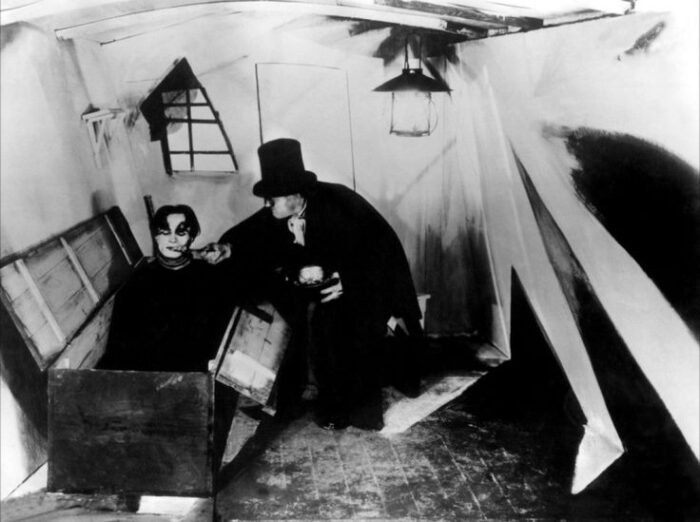
Das Cabinet des Dr. Caligari, via Pinterest.
Dr. Caligari is a film that needs to be seen to be believed. A true pioneer of the art form, Robert Wiene’s expressionist masterwork tells the story of a deranged doctor who uses a somnambulist (a sleepwalker) to commit murders on his behalf.
Featuring some of the most iconic images in all of cinema, The Cabinet of Dr. Caligari was met with critical acclaim upon its release, and it is widely considered to be one of the best German films of all time. In particular, the film’s use of expressionistic techniques – including its highly stylized sets and costumes – would go on to influence generations of American filmmakers. The Cabinet of Dr. Caligari is also notable for its portrayal of mental illness, which was a taboo subject at the time of the film’s release. By tackling the issue head-on, Wiene and his collaborators were able to create a deeply unsettling and atmospheric film that still resonates with audiences today.
If you’re interested in learning more about the German language, The Cabinet of Dr. Caligari is a great place to start. Being a silent film, the film is entirely subtitled in German, which means that you’ll be able to follow the story even if you’re not yet fluent in the language. And because the film is set in Germany, you’ll also get a taste of the country’s culture and history.
Nosferatu (1922)
Year: 1922
Director: F.W. Murnau
Main cast: Max Schreck, Gustav von Wangenheim, Greta Schröder
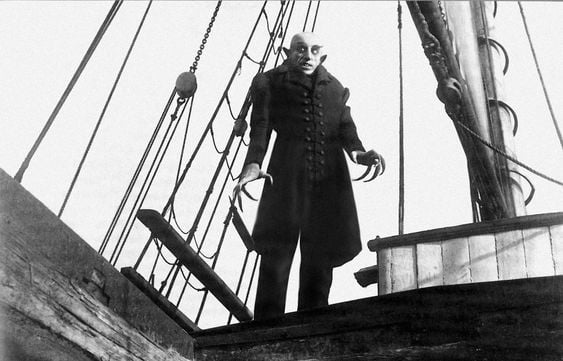
Nosferatu, via Pinterest.
Nosferatu is another essential German film, and it’s one that has had a profound influence on the horror genre. Released in 1922, the film is a loose adaptation of Bram Stoker’s novel Dracula, with the titular vampire being renamed Nosferatu in order to avoid copyright issues.
This foundational film tells the story of Count Orlok (played by the legendary Max Schreck), a vampire who arrives in the town of Wisborg, Germany in order to spread his curse. But, as the residents begin to succumb to the vampire’s terror, only one man – the young clerk Thomas Hutter – will be able to stand between Orlok and the complete destruction of the town.
Nosferatu is widely considered to be one of the earliest horror movies ever made. The film’s eerie atmosphere and its use of shadows and lighting to create a sense of dread have been imitated by countless filmmakers over the years, and the character of Count Orlok has become one of the most iconic monsters in all of horror.
Nosferatu is also a great film for German language learners, as it provides a crash course in the culture and history of Germany. The film is set in the town of Wisborg, which is based on the real-life city of Wismar, and it features a number of genuine German landmarks such as the Marienkirche and the Heiligengeistfeld. What’s more, the film is subtitled in German, which means that you’ll be able to familiarise yourself with the spelling of both common words and more expressive vocabulary related to human emotions.
Die Brücke (The Bridge) (1959)
Year: 1959
Director: Bernhard Wicki
Main cast: Folker Bohnet, Fritz Wepper, Michael Habeck
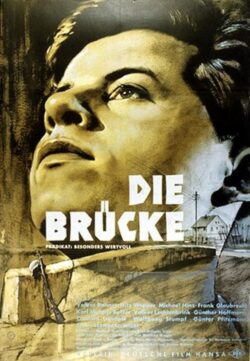
Die Brücke, via Pinterest.
Widely considered to be one of the best German movies of all time, Die Brücke is a German war film that tells the story of a group of German teenage boys who are conscripted into the Nazi army during the final days of the Second World War. As the Allied forces close in on their position, the boys – who are led by the idealistic Walter (Folker Bohnet) – must decide whether to flee or to stand and fight.
Die Brücke is notable for its gritty realism, which was a departure from the more romanticised portrayals of the Second World War that were common at the time. The film’s unflinching portrayal of the realities of war – including the futility of the Nazi cause and the horror of the Holocaust – made it highly controversial upon its release, but it has since come to be regarded as one of the best German movies of all time.
Although Die Brücke is a difficult watch, it’s an important film for anyone interested in the history of the Second World War as it provides a realistic and unvarnished portrayal of the conflict, while serving as a reminder of the human cost of war.
Die Brücke is also a great resource for German language learners, especially those who are interested in gaining vocabulary related to warfare, politics, and feelings. Unlike the films mentioned above, this is a spoken film, which means you’ll be able to listen to the dialogue and focus on different aspects of German pronunciation. If you’re not fluent enough to watch the movie with German subtitles, you can do it with English subtitles instead.
Angst essen Seele auf (Ali: Fear Eats the Soul) (1974)
Year: 1974
Director: Rainer Werner Fassbinder
Main cast: Brigitte Mira, El Hedi ben Salem, Barbara Valentin
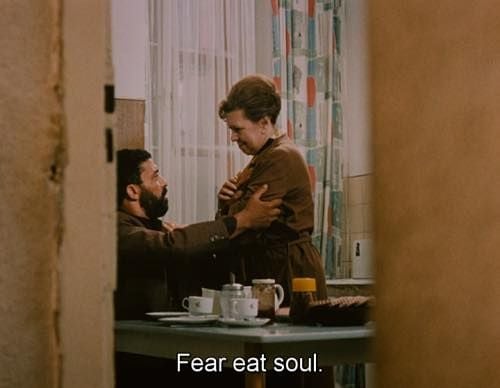
Angst essen Seele auf, via Pinterest.
Angst essen Seele auf is a German film by the iconic modernist director Rainer W. Fassbinder, and one of the best German movies of all time. It follows the story of an unlikely romance between Emmi (Brigitte Mira), a widow in her 60s, and Ali (El Hedi ben Salem), a Moroccan migrant worker who is nearly 30 years younger than her.
Despite the significant age difference, the two fall in love and decide to get married. However, their relationship is met with hostility from both Emmi’s family and the wider community, who view Ali as a gold digger and a thief.
Angst essen Seele auf is often cited as one of the greatest films ever made, and it was the recipient of the Golden Bear at the 1974 Berlin International Film Festival. The film is notable for its frank portrayal of the racism and xenophobia that was prevalent in Germany at the time, as well as its exploration of the theme of love across social boundaries.
What’s more, this film is a great choice for those who are interested in German social history as it provides insight into the experiences of migrants in Germany. Besides, since the main character, Ali, speaks only in the present tense and through very simple and straightforward vocabulary, intermediate learners should be able to understand most of what he says.
Das Leben der Anderen (The Lives of Others) (2006)
Year: 2006
Director: Florian Henckel von Donnersmarck
Main cast: Ulrich Mühe, Sebastian Koch, Martina Gedeck
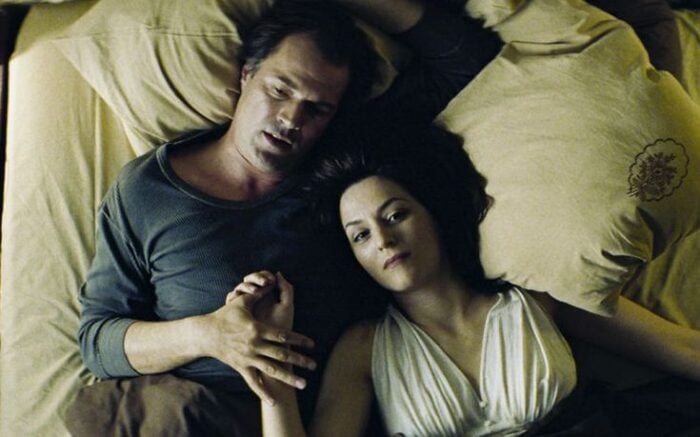
Das Leben der Anderen, via Pinterest.
Das Leben der Anderen follows the story of Stasi agent Gerd Wiesler (Ulrich Mühe), who is assigned to surveillance on playwright Georg Dreyman (Sebastian Koch) and his actress girlfriend Christa-Maria Sieland (Martina Gedeck). Wiesler soon discovers that the couple are not the loyal Communists the Party wants them to be, and he begins to question his own work as he starts to feel a deep connection to the very people he has to spy on.
Das Leben der Anderen was a critical and commercial success, winning the Oscar for Best Foreign Language Film in 2007. The film was widely praised for its portrayal of life in East Germany during the Communist era, and the delicate but powerful way in which it deals with difficult themes such as the human cost of totalitarianism, the power of the arts, and the importance of free expression.
Das Leben der Anderen is an excellent film for those interested in German history and the country’s experience of communism. It provides a detailed and nuanced depiction of life in East Germany, and it raises important questions about the price of authoritarianism. Being a contemporary film (though set in the 1940s), it’s also a wonderful opportunity to hear how German people speak today.
Though we could gleefully go on and on, these are some of the best German movies of all time. They are excellent, groundbreaking films that offer insights into different aspects of German culture and society, and a great place to start for anyone who is interested in being exposed to the German language through meaningful art and entertainment.
If after watching the movies in this list you feel inspired to take a few German lessons with a native teacher, don’t hesitate to send us a quick message.
→Sign Up Now: Free Trial German Lesson With a Native Teacher!←
We would be more than happy to help you get started on your German language journey!
Deyu, a client who took a face-to-face course during her stay in Frankfurt, said: “I had a really great experience with my German teacher Chris. He is very warm and friendly, and his English is very good, which means we can communicate with each other without any obstacles!”.
Would you like to take part in a personalised language-learning experience? Contact us today and get started!
